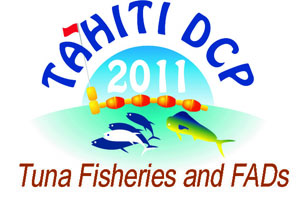Regional overviews of the use of anchored and drifting FADs (Palau)
1 : Bureau of Marine Resources - Ministry of Resources & Development
* : Corresponding author
Bureau of Marine Resources - Ministry of Resources & Development
P.O. Box 359 Koror PW 96940 -
France
Outer island communities of Palau have always benefitted from drifting wood and debris that aggregate pelagic fish. In 1980 the Secretariat of the Pacific Community (SPC) introduced a man made FAD and continued a second FAD Program from 1990 to 1994. It supported the introduction of four types of FADs - the McIntosh, Seychelles, Indian, and Hawaiian Sphere Steel designs. All designs aggregated fish, however strong winds proved fatal for these designs. The culprit to lose a FAD is that the inverse catenary loop may be too long and get chaffed by coral and wind & current bringing the FADs close to shallow coral. It is also speculated that a 2 ton anchor splits upon impact with the sea bed and the tugging on the anchor eventually cracks completely letting loose the whole system. Another factor is that during calm weather, the inverse catenary loop would surface and fishing vessel run over the rope and cut with the propeller. Over two decades, the Bureau of Marine Resources made many changes relating to the size of shackles, swivels, ropes, and floats and still problems occur. FAD deployed in March 2005 was active for 485 days and was suspected to have been vandalized. Two FADs were recently deployed however one has been reported missing after strong winds. The FAD components are costly, but the main concern for Palau is how all components can be specifically identified relative to their durability that could ensure longevity of the system. In this outcome the utilization of FADs can have greater impact to the sustainability of coastal fisheries, food security, job opportunities, diversity of ecotourism, and the overall socio-economic development in Palau.

 PDF version
PDF version
